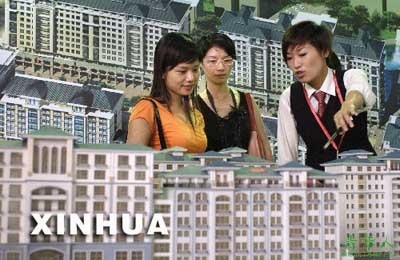
The average price of housing in Beijing and Shanghai has risen to more than 15,000 yuan ($2,200) a square meter, making it grossly unaffordable for most residents, especially for Beijingers earning around the 45,000 yuan average annual income.(Photo: Xinhua)
By Song Shengxia A new poll on a popular Chinese Web portal dares to ask whether people would have an affair in order to get money to pay for an expensive big-city apartment.
The poll followed the storyline of a controversial new TV series widely known by its huge following as Snail House. The soap opera depicts the lives of two young sisters, including one named Haizao, who becomes the mistress of a high-ranking government official in order to help her sister buy an expensive apartment in a city modeled after Shanghai.
The corresponding survey on Sina.com.cn had polled more than 10,200 people as of last night, and about 47 percent said they would have such an affair, on the grounds that "love without material foundations won't guarantee happiness."
The show has drawn numerous reviews and debate on the Internet, in the media and on television, as it is believed to have stricken a resonant chord among common people who are struggling to own a home against soaring property prices across the country.
As China's decision-makers gathered in Beijing on Saturday to map out economic policies for 2010, the prospect of any move on the housing industry has become a public concern.
Although little was disclosed via official media about the results in the conference, experts predicted that the conference would focus on five areas: monetary policy, transforming the development model and economic restructuring, consumer market, containing inflation and real estate credit policy, as already hinted at during the meeting of the Political Bureau of the Central Committee of the CPC held November 27.
According to the November 27 meeting, the government said it would continue its proactive fiscal policy and moderately ease monetary policy next year.
Residents are pinning hopes on the government issuing a policy to curb soaring property prices, which dropped at the beginning of last year when the financial crisis started picking up steam but resurged later after the central government reduced the interest rate and increased lending to the real estate sector.
The average price of housing in Beijing and Shanghai has risen to more than 15,000 yuan ($2,200) a square meter, making it grossly unaffordable for most residents, especially for Beijingers earning around the 45,000 yuan average annual income.
But those soaring prices haven't seemed to put a damper on the home-buying frenzy.
On Wednesday, in Hangzhou, a city about a two-hour drive from Shanghai, hundreds of residents gathered overnight in front of the sales office for a property project priced at 16,800 yuan per square meter, People's Daily reported.
The developer ended up selling all 400 of the units three days ahead of the official sales date.
The buying craze has been especially strong on the resale market. By November, 230,000 homes had changed hands in Beijing during the year – already 3.3 times the total last year, and 2.5 times that seen in 2007, according to the Beijing Youth Daily.
Policy change unlikely
Despite a public outcry for more affordable homes, experts suggest that residents shouldn't rely too much on government policy to contain the current hype in the real estate market, as an instant turnover early next year is unlikely.
"Since the real estate industry plays a big role in boosting the national economy, it is impossible for the government to curb the development of the housing industry," Tian Yun, an expert on macro economics at the Academy of China's Macro Economy, told the Global Times.
The real estate industry comprises 6.6 percent of the total GDP and accounts for one fourth of investments. It is connected with 60 sectors and is becoming the lifeblood of China's economy, said Yu Bin, director of Macro-economic Research Department of the Development Research Center of the State Council.
The largest incentive for local governments to maintain the real estate boom comes from the profit they reap from selling land, analysts said.
By November 23, the governments of 70 cities surveyed by the China Institute of Index Research had doubled their earnings from land sales over the same period last year. The Shanghai government ranked first, making 82.1 billion yuan, an increase of 115 percent, year-on-year, according to the China Business Network.
Gao Haiyan, a director at the Shenzhen Research Institute under the Chinese Academy of Social Sciences, suggested that the tuning of the real estate market will probably occur in the second half of next year, as the government may slowly control the flow of capital in the face of increasing inflation pressures.
Inflation expected next year
Despite the global downturn, China outperformed other major economies in 2009. Its third-quarter gross domestic product (GDP) grew by 8.9 percent, year-on-year, and the economic growth for the year is expected to exceed 8 percent.
More than half of 120 economists and industry leaders surveyed by CCTV said they expected China to experience inflation in the near future, with 42 percent believing it would come by the second half of 2010.
But reputed economist Wu Jinglian said that it is time for the government to tighten up its monetary policy now, as inflation has actually been hiding in the current appearance of an unscathed booming economy.
However, 69 percent of the experts polled said the government should only slightly adjust the fiscal policy, as an abrupt move may interrupt healthy growth.
Guo Qiang and Liang Chen contributed to the story
责任编辑:sealion1986
